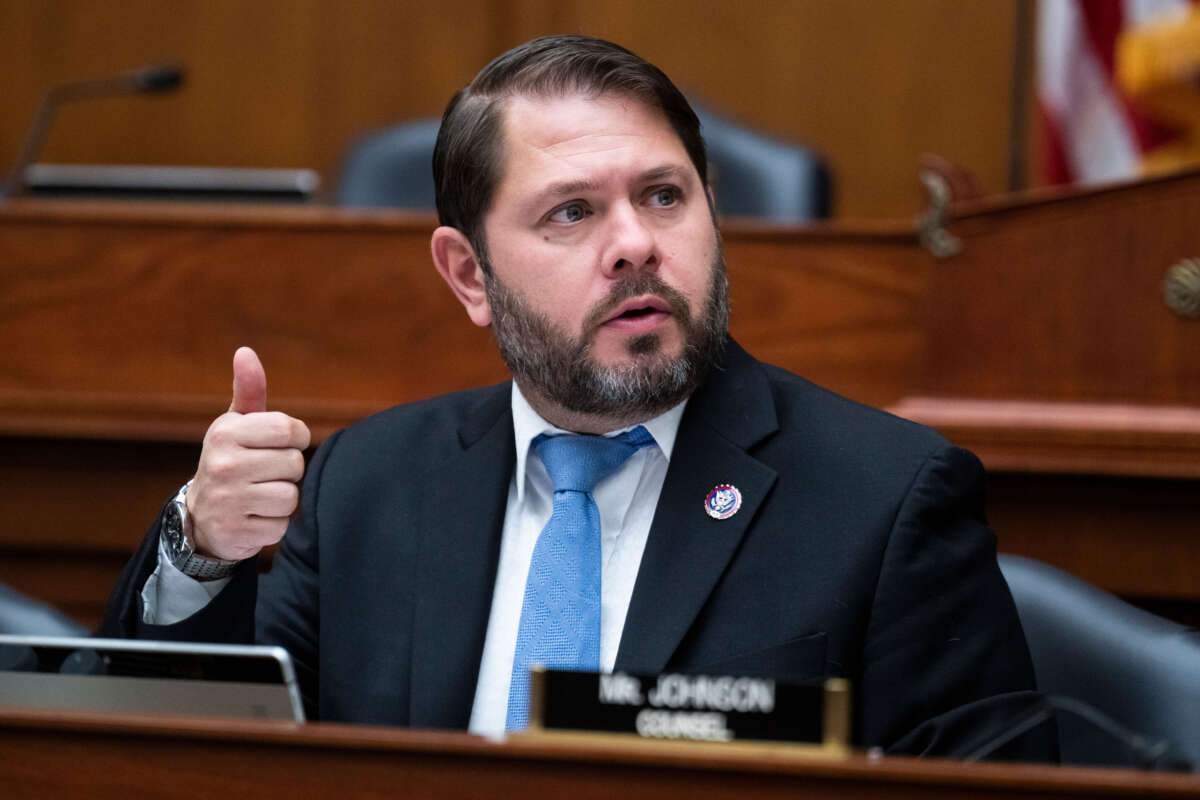New polling out of Arizona shows that Rep. Ruben Gallego (D) is ahead of both Republican Kari Lake and incumbent Sen. Kyrsten Sinema (I) in a three-way contest for the state’s U.S. Senate seat in next year’s elections.
Gallego receives a plurality of support from voters, though not a majority, according to the statewide Noble Predictive Insights poll that was conducted from October 25-31. He leads the three contenders with 39 percent backing from voters in the state. Lake comes in second, with 33 percent support, while Sinema is close behind with 29 percent.
Data from the poll shows that Sinema was pulling more Republican votes away from Lake than she was Democratic votes from Gallego. Other polls — including one commissioned by Republicans around the same time — also show Gallego with the lead among the three.
The race is being closely watched, as it is imperative for Democrats to win in order for the party to retain its slim control of the Senate beyond 2024.
Gallego announced his run for the Senate seat in January this year, one month after Sinema officially announced that she was no longer a Democrat but an independent after voting against several Democratic initiatives as senator.
Lake, an unsuccessful candidate for Arizona governor, is a staunch devotee of Donald Trump and frequently employs rhetoric similar to that used by the former president, including denying the legitimate outcome of her election loss. She has, for example, made producing so-called “honest” election results — by implementing changes to elections law that will likely create burdensome restrictions for voters — a cornerstone of her campaign.
Gallego, a former Marine who supports progressive policies such as Medicare for All, went after Sinema in his initial campaign announcement earlier this year, criticizing her for cozying up to corporate lobbyists and for taking stances that went against the values of her constituents.
“The rich and the powerful, they don’t need more advocates,” Gallego said in his first campaign message. “It’s the people that are still trying to decide between groceries and utilities that need a fighter for them. … If you’re more likely to be meeting with the powerful than the powerless, you’re doing this job incorrectly.”
Sinema has lost the respect of many in the state and within the Democratic Party for repeatedly aligning herself with Republicans in key Senate votes after she won office in 2018. Despite initially branding herself as a progressive, she opposed changing filibuster rules in the upper house of Congress, which doomed the prospects of passing the Voting Rights Act. She also reportedly celebrated with Republicans when an omnibus spending package passed without the inclusion of a provision extending child tax credits; the cancellation of child tax credits has since sent millions of U.S. children back into poverty.
At one point, party strategists may have viewed a challenge to Sinema as dangerous to Democrats’ chances of retaining control of the narrowly divided Senate beyond next year — conventional election wisdom states that two candidates who are purportedly of the same or similar political leanings would ultimately help the candidate from the opposing party. But the new polling shows that Gallego challenging Sinema, who still caucuses with Democrats in the Senate, won’t upset the balance of power within that chamber.
Democrats are facing difficult odds of retaining seats elsewhere, however. West Virginia Sen. Joe Manchin, a right-wing Democrat, has announced that he won’t be seeking reelection in his state, where Republicans are now expected to win. Democratic Sens. Jon Tester of Montana and Sherrod Brown of Ohio are also facing challenging reelection odds. With Manchin’s announcement, their seats are “must wins” for Democrats — if the party loses even one more seat in the Senate, they will lose their majority status.
Angry, shocked, overwhelmed? Take action: Support independent media.
We’ve borne witness to a chaotic first few months in Trump’s presidency.
Over the last months, each executive order has delivered shock and bewilderment — a core part of a strategy to make the right-wing turn feel inevitable and overwhelming. But, as organizer Sandra Avalos implored us to remember in Truthout last November, “Together, we are more powerful than Trump.”
Indeed, the Trump administration is pushing through executive orders, but — as we’ve reported at Truthout — many are in legal limbo and face court challenges from unions and civil rights groups. Efforts to quash anti-racist teaching and DEI programs are stalled by education faculty, staff, and students refusing to comply. And communities across the country are coming together to raise the alarm on ICE raids, inform neighbors of their civil rights, and protect each other in moving shows of solidarity.
It will be a long fight ahead. And as nonprofit movement media, Truthout plans to be there documenting and uplifting resistance.
As we undertake this life-sustaining work, we appeal for your support. Please, if you find value in what we do, join our community of sustainers by making a monthly or one-time gift.
